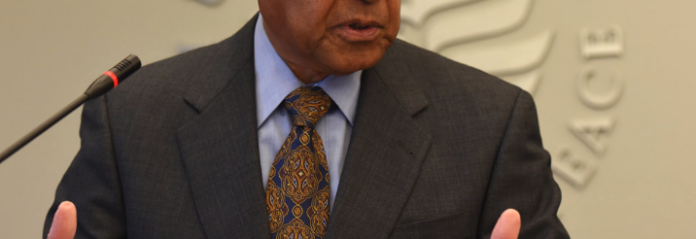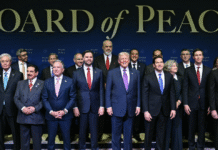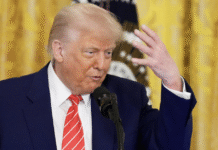Well, it’s no wonder the U.S. Institute of Peace was deleting information. They were allegedly sending contracts to a former Taliban official and doling out cash to groups like the Iraqi League for Youth—an outfit that may sound like a soccer club but, according to Elon Musk’s repost of investigative claims, was tied to all kinds of financial funny business.
When you’re allegedly engaging in funding groups with links to a terrorist regime and perhaps the drug trade, it suddenly makes a lot more sense why someone would want to delete a terabyte of financial records. A terabyte. That’s not cleaning out your inbox—that’s digital arson.
Elon Musk, who’s been playing an increasingly hands-on role in exposing bureaucratic rot through the Department of Government Efficiency (DOGE), dropped the accusation on X, and naturally, the professional pearl-clutchers came running. He claims the data was nuked in an attempt to “cover their crimes,” but joked that the folks at USIP “don’t understand technology” so it was recovered anyway. Oops. Not the sharpest pencils in the federal drawer.
So the US Institute of Peace was simultaneously funding the Taliban while lobbying the Taliban to keep illegal drugs flowing from the world’s largest narcotics zone. https://t.co/RPbZiHYkLU pic.twitter.com/gYGP8W3DVs
— Mike Benz (@MikeBenzCyber) April 1, 2025
Now let’s be clear: Musk hasn’t posted proof yet, but given that we’re talking about an organization that barricaded its doors and had to be pried open by the police to allow the new leadership in, it’s not exactly far-fetched to believe they were trying to hide something. You might recall this little nugget from just days ago—USIP President George Moose, after being informed he was out, decided to LARP as a warlord and locked down the entire building. His replacement, Kenneth Jackson, couldn’t even get in. The lights were out, the internet was dead, white noise machines were humming, and staff were using walkie-talkies to communicate like they were operating a Cold War spy cell.
They were bribing the Afghan Taliban warlords to keep the drugs flowing. That’s what the US Institute of Peace payments were for. https://t.co/2dwhkISdLY pic.twitter.com/WFf0lyU2Zp
— Mike Benz (@MikeBenzCyber) April 1, 2025
When Jackson finally got the police involved, Moose still refused to leave until he was physically escorted out. Meanwhile, internal emails were uncovered showing staff had been prepping for weeks to resist DOGE’s arrival. They circulated photos of incoming leadership—because, apparently, identifying your duly appointed superiors is now an act of “peacebuilding”—and told security to treat them like potential intruders. Even a security guard was reportedly blocked from leaving the building. And this, folks, is the outfit that insists it’s all about promoting global harmony.
But let’s return to the core issue: where did the money go? According to the conservative account Musk reposted, DOGE found contracts with Afghanistan’s former chief of protocol—a guy with Taliban ties—and payments to the Iraqi League for Youth, a group that, while publicly billed as “peace-focused,” seems to have raised a few too many red flags for comfort.
And don’t forget the growing concern that some of these taxpayer-funded “peace initiatives” were allegedly being funneled through organizations with indirect or direct links to narcotics trafficking networks. You can’t make this stuff up. Or rather, you don’t need to—because apparently, someone at USIP already tried to delete it.
I’ve brought to light how we are sending 40-87 million dollars to the Taliban for about a year now. I could never put together why the U.S. would be funding terrorism after fighting it for over 20 years. As it turns out, it was for the opium trade. I’ve said it several times… https://t.co/Krg3mFF0qZ
— Shawn Ryan (@ShawnRyan762) April 1, 2025
Of course, defenders of the swamp will whine that this is all an “illegal takeover,” that USIP is an “independent nonprofit” and somehow not subject to executive authority. Cute theory—except Congress funds it, the President appoints its board, and DOGE was legally empowered to enforce an executive order that reduced USIP to its statutory minimum. The only illegal activity was a group of rogue bureaucrats refusing to leave, disabling building systems, and possibly erasing damning financial data in the process.
Even now, the excuses keep coming. “The Taliban is technically the government,” some say, “so the funds had to go through them.” Sure, if you’re doing a peace deal—but how exactly does that justify contracts with their former leadership, let alone folks allegedly linked to the drug trade? This is like hiring a bank robber to run your accounting office and calling it “conflict resolution.”
Meanwhile, Elon Musk’s involvement has drawn the usual media freakout, but that’s par for the course. They’d rather obsess over whether he’s technically the head of DOGE or not than deal with the fact that a federally funded agency appears to have functioned more like a rogue intelligence cell than a peace organization.
The question isn’t whether Musk is exaggerating—the question is why we’re just now hearing about all of this. If a terabyte of financial data was deleted, and contracts were going to shady foreign groups under the guise of “peace,” we have every right to ask: how many more agencies are running their own little foreign policy operations behind the curtain?
🚨🇺🇸 ELON: U.S. INSTITUTE OF PEACE TRIED TO DELETE TALIBAN FUNDING RECORDS—DOGE RECOVERED IT
Elon says the U.S. Institute of Peace deleted 1TB of financial data linking them to funding Taliban and Iraqi leadership—but DOGE wasn’t fooled.
According to Elon, the agency attempted… https://t.co/Un5v0GvYxb pic.twitter.com/wKIenOejAs
— Mario Nawfal (@MarioNawfal) April 1, 2025
One thing’s certain: the Trump administration’s crackdown is long overdue, and the swamp is starting to smell a whole lot more like smoke from a hard drive fire.







